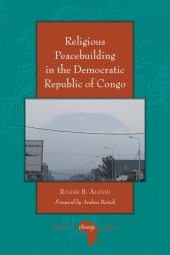 Neuerscheinungen 2019Stand: 2020-02-01 |
Schnellsuche
ISBN/Stichwort/Autor
|
Herderstraße 10
10625 Berlin
Tel.: 030 315 714 16
Fax 030 315 714 14
info@buchspektrum.de |

Roger Alfani
Religious Peacebuilding in the Democratic Republic of Congo
Neuausg. 2019. XX, 214 S. 225 mm
Verlag/Jahr: PETER LANG LTD. INTERNATIONAL ACADEMIC PUBLISHERS 2019
ISBN: 1-433-16324-1 (1433163241)
Neue ISBN: 978-1-433-16324-1 (9781433163241)
Preis und Lieferzeit: Bitte klicken
Religious Peacebuilding in the Democratic Republic of Congo analyzes the contributions of three churches at both the leadership and the grassroots levels to conflict transformation in Goma, Democratic Republic of Congo.
Religious Peacebuilding in the Democratic Republic of Congo analyzes the contributions of three churches at both the leadership and the grassroots levels to conflict transformation in Goma, Democratic Republic of Congo. While states have long been considered main actors in addressing domestic conflicts, this book demonstrates that religious actors can play a significant role in peacebuilding efforts. In addition, rather than focusing exclusively on top-down approaches to conflict resolution, Religious Peacebuilding in the Democratic Republic of Congo incorporates viewpoints from both leaders of the Catholic, 3 ème Communauté Baptiste au Centre de l´Afrique and Arche de l´Alliance in Goma and grassroots members of these three churches.
Abbreviations - Acknowledgments - Foreword - General Introduction - Religious Peacebuilding in Goma: A Conceptual Framework - From Missionary Works to Local Churches in Goma - What Kinds of Peace? - A Comparative Analysis of the Catholic, 3 ème CBCA, and Arche Churches in Goma - General Conclusions - Index.
"Roger B. Alfani´s work on religion and peace-building makes a significant and welcome contri-bution to the scholarship on the Eastern Democratic Republic of Congo. Few scholars of the region have done this kind of qualitative research on the subject, particularly in a way that so effectively engages both the leadership and grassroots members of diverse religious communities. Given the significance of religion to the everyday lives of individuals and communities in Eastern Congo, and to their overall understandings and perceptions of peace and conflict, such oversight is, indeed, troubling. Alfani´s work makes important steps toward developing a substantive, quali-tative, evidence-driven analysis of these issues. But more importantly, he does so with great nu-ance, paying attention to both the ways in which such communities can contribute to and exac-erbate conflict and the ways in which such communities encourage and facilitate peace building." Nicole Eggers, Assistant Professor of African History, University of Tennessee-Knoxville


